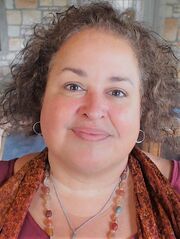Resources
From blogs, videos, podcasts, and interviews--find resources that answer your questions about being an end-of-life doula.
PODCAST EPISODES HERE
PODCAST EPISODES HERE
|
non-medical support role. The two are polar opposites in terms of managing the care for the person and family at the end of life. One is leading care, and one is reinforcing what the leader is suggesting and offering.
Another difference is that in hospice, all the main professionals attending to the person who is dying and their family are licensed in their role—the physician, nurse, social worker. The volunteers have been vetted by the hospice agency; they go through a “hiring” process similar to the professional staff. The Certified Nursing Assistants must go through a state approved certification process. The End-of-Life Doula is a new role in our family support system and at present is not required to be licensed nor certified.
The common community standard that has grown into place over the years, led by the professional end of life doulas themselves, is to train with a reputable End-of-Life Doula Training program and become certified under that organization. It is voluntary and end of life doulas are self-regulated.
Hospice roles are clearly understood and are the same in every state. The role of the end of life doula is in its infancy and the profession is developing. The National End-of-Life Doula Alliance (NEDA) was developed to bring standards of practice and core competencies to the role in the fall of 2017. NEDA’s definition of an end-of-life doula is: “End-of-life doulas provide non-medical, holistic support and comfort to the dying person and their family, which may include education and guidance as well as emotional, spiritual or practical care, from as early as initial diagnosis through bereavement.” NEDA developed an assessment to measure core competencies to ensure that all doulas have the same body of knowledge (I am very proud to be a founding member and was NEDA’s first Vice President.)
Another difference is that hospice is a Medicare benefit and free to people over 65 years of age. If you are under 65 and have a terminal condition, then you may still have hospice service, but it is not free. Payment arrangements must be made. End-of-Life Doulas are not reimbursed by the healthcare system and are fee for service, just like personal companion services or consulting services.
We must remember that hospice is a medical service and end-of-life doulas are NON-MEDICAL. End-of-Life Doulas may overlap some in their role of deep listening and practical support with team members, but they are not leading the care, nor are they presenting themselves as such. Their main offering is emotional and practical support with compassion and an end of life knowledge base. Bottom line--hospice is clinical support and end-of-life doulas are non-medical support (an adjunct to hospice service).
Watch the Video Here:
In the video:
00:20: NHPCO End of Life Doula Advisory Council. 00:40: Download Resources Here 01:00: Hospice, Medicare Approved service. 02:45: End-of-Life Doula Reimbursement. 02:55: Community Doulas. 03:40: How do you enter hospice service? 04:00: How do you get the services of a death doula? 04:30: Finding a Doula. 05:24: Chart and explanation of differences. 07:48: Licensed role vs unlicensed role. 08:45: What an end-of-life doula is not. 10:20: How National End-of-Life Doula Alliance unifies us. 11:24: National End-of-Life Doula Alliance, core competencies. 14:10: The kinds of people who are doulas. 14:40: Our common ground. 15:08: Type of care provided for each. 15:45: How are hospice and doulas the same? 15:52: Emotional support overlap. 16:24: Vigil time overlap. 17:08: Bereavement support overlap. 17:50: Do doulas do personal care? 18:20: Pre-death planning. 19:04: Doula vs non-doula roles 20:00: We are hospice advocates, too. 21:00: End-of-Life doulas are the bridge. |
Are you interested in serving at the end of life in your own unique way?

"It's 100% possible!"
Categories
All
|